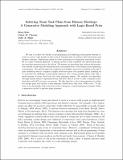| dc.contributor.author | Kim, Been | |
| dc.contributor.author | Chacha, Caleb M. | |
| dc.contributor.author | Shah, Julie A. | |
| dc.date.accessioned | 2015-06-01T16:19:46Z | |
| dc.date.available | 2015-06-01T16:19:46Z | |
| dc.date.issued | 2015-03 | |
| dc.date.submitted | 2014-07 | |
| dc.identifier.issn | 1943-5037 | |
| dc.identifier.issn | 1076-9757 | |
| dc.identifier.uri | http://hdl.handle.net/1721.1/97138 | |
| dc.description.abstract | We aim to reduce the burden of programming and deploying autonomous systems to work in concert with people in time-critical domains such as military field operations and disaster response. Deployment plans for these operations are frequently negotiated on-the-fly by teams of human planners. A human operator then translates the agreed-upon plan into machine instructions for the robots. We present an algorithm that reduces this translation burden by inferring the final plan from a processed form of the human team's planning conversation. Our hybrid approach combines probabilistic generative modeling with logical plan validation used to compute a highly structured prior over possible plans, enabling us to overcome the challenge of performing inference over a large solution space with only a small amount of noisy data from the team planning session. We validate the algorithm through human subject experimentations and show that it is able to infer a human team's final plan with 86% accuracy on average. We also describe a robot demonstration in which two people plan and execute a first-response collaborative task with a PR2 robot. To the best of our knowledge, this is the first work to integrate a logical planning technique within a generative model to perform plan inference. | en_US |
| dc.description.sponsorship | United States. Dept. of Defense. Assistant Secretary of Defense for Research & Engineering (United States. Air Force Contract FA8721-05-C-0002) | en_US |
| dc.language.iso | en_US | |
| dc.publisher | Association for the Advancement of Artificial Intelligence | en_US |
| dc.relation.isversionof | http://dx.doi.org/10.1613/jair.4496 | en_US |
| dc.rights | Article is made available in accordance with the publisher's policy and may be subject to US copyright law. Please refer to the publisher's site for terms of use. | en_US |
| dc.source | Association for the Advancement of Artificial Intelligence | en_US |
| dc.title | Inferring team task plans from human meetings: A generative modeling approach with logic-based prior | en_US |
| dc.type | Article | en_US |
| dc.identifier.citation | Kim, Been, Caleb M. Chacha, and Julie A. Shah. "Inferring team task plans from human meetings: A generative modeling approach with logic-based prior." Journal of Artificial Intelligence Research 52 (2015): 361-398. © 2015 AI Access Foundation | en_US |
| dc.contributor.department | Massachusetts Institute of Technology. Computer Science and Artificial Intelligence Laboratory | en_US |
| dc.contributor.department | Massachusetts Institute of Technology. Department of Aeronautics and Astronautics | en_US |
| dc.contributor.mitauthor | Kim, Been | en_US |
| dc.contributor.mitauthor | Chacha, Caleb M. | en_US |
| dc.contributor.mitauthor | Shah, Julie A. | en_US |
| dc.relation.journal | Journal of Artificial Intelligence Research | en_US |
| dc.eprint.version | Final published version | en_US |
| dc.type.uri | http://purl.org/eprint/type/JournalArticle | en_US |
| eprint.status | http://purl.org/eprint/status/PeerReviewed | en_US |
| dspace.orderedauthors | Kim, Been; Chacha, Caleb M.; Shah, Julie A. | en_US |
| dc.identifier.orcid | https://orcid.org/0000-0003-1338-8107 | |
| mit.license | PUBLISHER_POLICY | en_US |
| mit.metadata.status | Complete | |
